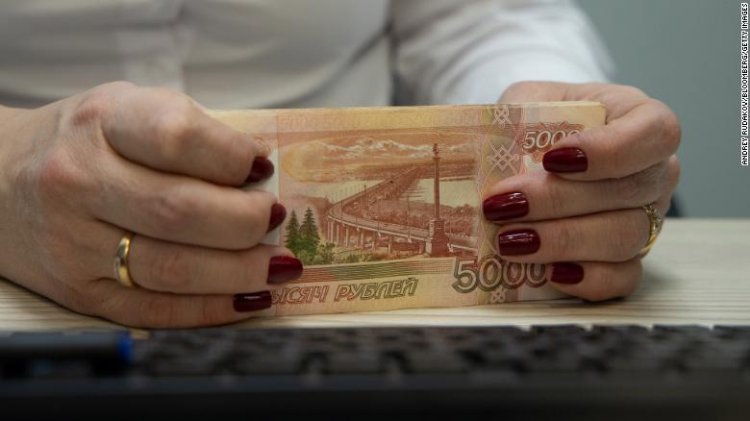As sanctions wreak havoc on Russia's economy, the country is on the verge of collapse.
At 6 a.m. ET, the ruble had lost roughly 20% of its value and was trading at 100 to the dollar, after falling as much as 40?rlier. According to a statement from the country's central bank, the start of trading on the Russian stock market was delayed, then postponed outright.

Russia was scrambling Monday to save its economy from collapsing as a slew of crippling Western sanctions were imposed over the weekend in reaction to the invasion of Ukraine.
Following the ruble's record low versus the dollar, the Russian central bank more than quadrupled interest rates to 20%, and the Moscow stock exchange was closed for the day, President Vladimir Putin was set to conduct crisis talks with his top aides.
As savers rushed to withdraw their funds, the European arm of Russia's largest bank was on the verge of failing. Economists have predicted that the Russian economy will contract by 5%.
At 6 a.m. ET, the ruble had lost roughly 20% of its value and was trading at 100 to the dollar, after falling as much as 40% earlier. According to a statement from the country's central bank, the start of trading on the Russian stock market was delayed, then postponed outright.
The United States, the European Union, the United Kingdom, and Canada announced Saturday that they will exclude some Russian banks from SWIFT, a global financial messaging service, and "paralyze" Russia's central bank's assets.
In a note published on Monday, Liam Peach, an emerging market economist at Capital Economics, stated, "The ratcheting up of Western sanctions over the weekend has placed Russian banks on the verge of collapse."
Freezing reserves
Putin's government has spent the past eight years preparing Russia for tough sanctions by building up a war chest of $630 billion in international reserves including currencies and gold, but at least some of that financial firepower is now frozen and his "fortress" economy is under unprecedented assault.
"We will ... ban the transactions of Russia's central bank and freeze all its assets, to prevent it from financing Putin's war," European Commission President Ursula von der Leyen said in a statement Sunday.
The United States also banned US dollar transactions with the Russian central bank in a move designed to prevent it from accessing its "rainy day fund," senior US administration officials said.
"To put it simply, we aim to ensure that the Russian economy regresses as long as President Putin decides to pursue his invasion of Ukraine," a senior administration official stated.
According to Capital Economics' Peach, over 40% of Russia's reserves are now off-limits to Moscow.
The Russian central bank stated that "external conditions for the Russian economy have substantially changed." "This is required to maintain financial and price stability, as well as to protect citizens' savings from depreciation," the bank noted.
On Tuesday, at 9 a.m. local time (1 a.m. ET), the central bank will offer an update on stock trading.
A run on the banks
Analysts have warned that the upheaval in Russia might lead to a bank run as savers try to protect their deposits and stockpile cash.
"As a result of this weekend's events, no G7 banks will be able to buy Russian rubles, sending the currency into free-fall, with the result being a huge inflationary shock unfolding inside Russia," said Michael Hewson, chief market analyst at CMC Markets UK, in a note.
"A run on Russian banks appears to be underway inside the country, as ordinary Russians fear their credit cards will stop working," he added.
"These are the elements that lead to local bank runs," Capital Economics chief economist Neil Shearing stated.

 Boakyewaa Lawrencia
Boakyewaa Lawrencia 



































